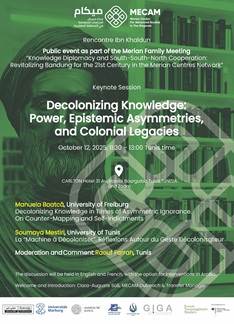
Rencontre Ibn Khaldun: Keynote Session on “Decolonizing Knowledge: Power, Epistemic Asymmetries, and Colonial Legacies”, organized as part of the Merian Family Meeting “Knowledge Diplomacy and South-South-North Cooperation” – October 12, 2025 at 11:30 Tunis time
This multilingual Rencontre Ibn Khaldun event will feature two keynotes offering different perspectives on the topic of decolonizing knowledge. In the first, Prof. Manuela Boatcă will speak in English on “Decolonizing Knowledge in Times of Asymmetric Ignorance: On Counter-Mapping and Self-Indictments”. The second keynote, delivered in French by Prof. Soumaya Mestiri, is titled “La ‘machine à décoloniser’ : réflexions autour du geste décolonisateur”. The discussion that follows will be facilitated by Raouf Farrah and conducted in English and French, with the possibility for interventions in Arabic.
Abstracts of the keynotes:
- Manuela Boatcă (University of Freiburg): “Decolonizing Knowledge in Times of Asymmetric Ignorance: On Counter-Mapping and Self-Indictments”: How do knowledge producers – in the social sciences and beyond – try to grapple with the geopolitical positionalities built in the reigning self-understanding of their institutional structures and disciplines? In the following, I discuss counter-mapping as a decolonial strategy to the essentialization of nation-states and world regions in social scientific and political discourse and argue for a relational perspective capable of revealing the constitutive entanglements through which a global capitalism grounded in colonial expansion interlinked all areas of the world. The focus lies on the entanglements that counter-mapping as a method uncovers between Europe and Africa, which Occidentalist social science has repeatedly constructed as fixed and unrelated locations on imperial maps. (in English)
- Soumaya Mestiri (University of Tunis): “La ‘machine à décoloniser’. Réflexions autour du geste décolonisateur”: The aim of the keynote is to examine the propensity to decolonize, both as a phenomenon and as a practice. Is it possible – or even desirable – to decolonize everything? Might radicalism sometimes lie in the very refusal to decolonize, or at the very least, in approaching the issue in terms of degree rather than nature? The reflection will be structured around these central questions. (in French)
Location: Hotel Carlton Tunis, 31 Ave Habib Bourguiba, Tunis 1000 and on Zoom: Link Zoom
